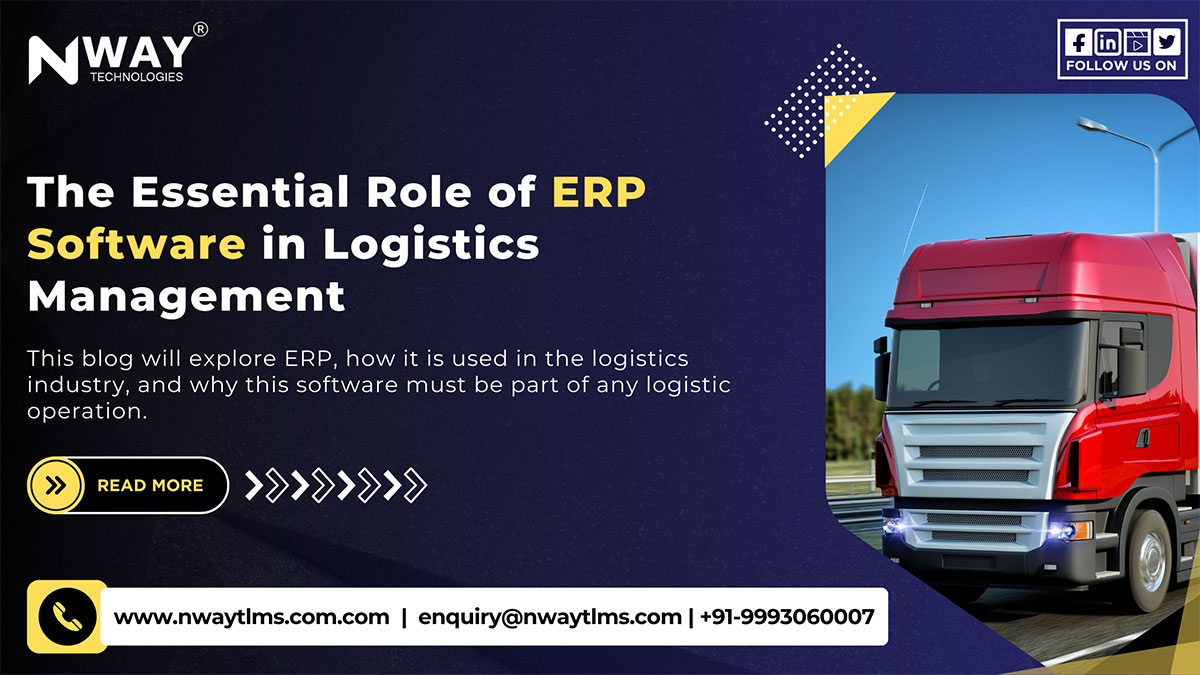The Essential Role of ERP Software in Logistics Management

The right tools can be the key to success in the world of complex logistics management. Every second counts, and each decision has a direct impact on the bottom-line. Enterprise Resource Planning software has been a major game changer in the last few years. This blog will explore ERP, how it is used in the logistics industry, and why this software must be part of any logistic operation.
Understanding ERP and Logistics Management
Let’s take a moment to understand ERP and its role in streamlining processes before we get into why ERP software for logistics is so important.
ERP is an integrated suite of applications that automates and manages core business processes such as procurement, finance, HR, and inventory. ERP consolidates data and business processes in a single platform, allowing organizations to increase efficiency and visibility across departments.
Let’s now turn to logistics management. Logistics management is the process of planning, executing, and controlling the flow of products and services between the point of origin and the point of consumption. It includes a variety of tasks, such as inventory management, transport, storage, and order fulfillment.
Reasons why ERP Software is a Must for Logistics Management
1. ERP Software Provides a Centralized Platform
ERP provides a central platform to manage all logistics operations from the order processing through delivery tracking. ERP software eliminates the silos between departments by integrating functions like inventory management, transportation and procurement.
2. ERP Software Provides Real-Time Information
Logistics managers can gain instant access to information about inventory, orders, and shipments. The visibility of the software allows managers to make better decisions, as they can respond quickly to changing demand and optimize routes.
3. Improved Inventory Management
Achieving effective inventory management in logistics is essential to minimize costs and maximize warehouse space. It will help you avoid stockouts. ERP software provides advanced inventory tracking features that allow businesses to track stock movements and accurately forecast demand.
4. Optimization of Route Planning
Transport is an important component in logistics. Optimizing routes has a major impact on delivery time and costs. ERP software includes route optimization tools which take into account factors like distance, traffic, delivery schedules, etc. to determine the best routes.
5. Compliance and Regulations
Logistics companies can find it difficult to navigate the complicated landscape of compliance requirements and regulatory standards. ERP software streamlines compliance by automating reporting and ensuring industry standards are adhered to, as well as maintaining audit trails.
6. Data-driven Decision Making
ERP Software collects, analyses, and processes vast quantities of data. This provides valuable insight into KPIs such as inventory turnover, delivery time, and transportation costs. Logistics managers who use these insights can drive growth and profitability by making data-driven, informed decisions.
7. Flexible and Scalable Solutions
Logistics companies are growing and expanding their business, so they require flexible solutions which can be adapted to the changing needs of businesses. ERP software is scalable and flexible, which allows businesses to add new features and integrate third-party applications, as well as accommodate growing transaction volumes.
ERP Software in Logistics Management: The Future
The future of ERP in the logistics industry is bright, as technology advances at an accelerated pace. This is a look at how ERP will shape the future in logistics management.
Integrating Emerging Technologies
ERP providers are increasingly including emerging technologies like artificial intelligence (AI), Machine Learning (ML), Internet of Things, and Internet of Things in their platforms. The technologies can revolutionize the logistics industry by providing predictive analytics, self-driving vehicles and intelligent warehouses. AI and ML can analyze vast quantities of data in order to predict demand and detect anomalies. IoT sensors provide real-time insight into the location and condition of shipments.
Transparency and Visibility – Enhanced
ERP software in the future will offer even more visibility and transparency throughout the supply chain. ERP software can integrate blockchain technology to produce transparent, immutable ledgers that improve traceability, and reduce fraud risk. Logistics companies will be able to track goods from the manufacturer all the way to their end consumers with greater accuracy.
Personalized Customer Experiences
ERP software will allow logistics firms to provide a more responsive and personalized customer experience. ERP software can predict customer preferences and optimize delivery schedules by leveraging predictive analytics and customer data. It also offers tailored services, such as same day delivery and flexible pick-up options. Personalization increases customer satisfaction, brand loyalty, and competitive edge.
Ecosystem Collaboration
ERP systems in the future will enable greater integration and collaboration within the logistic ecosystem. ERP systems will facilitate seamless coordination and data exchange across the supply chain by connecting to suppliers, carriers and 3PLs. The collaboration between the two will improve supply chain efficiency, decrease lead times and increase efficiencies.
Sustainable Development
ERP will be a key tool for logistics firms to achieve their sustainability goals as environmental issues become more important. ERP software will include sustainability metrics, reporting, and optimization capabilities. This allows companies to monitor their carbon footprints, reduce waste and maximize resource use. ERP software allows logistics firms to be more eco-friendly, from green packaging to environmentally friendly transportation.
Read More : How to Implement Transport ERP Successfully Essential Steps and Best Practices
Conclusion
ERP has become a vital tool in the fast-paced world of business. ERP software helps logistics firms to remain competitive by streamlining their operations, improving inventory management, optimizing route, assuring compliance, offering data-driven decisions, and scalability. ERP is a must-have for logistics companies that want to increase efficiency, grow, and provide value in this digital age.